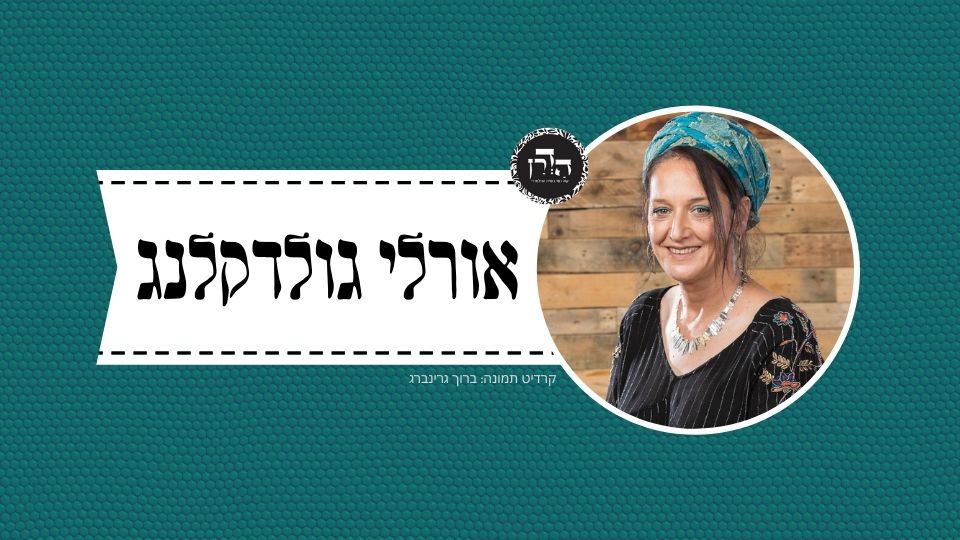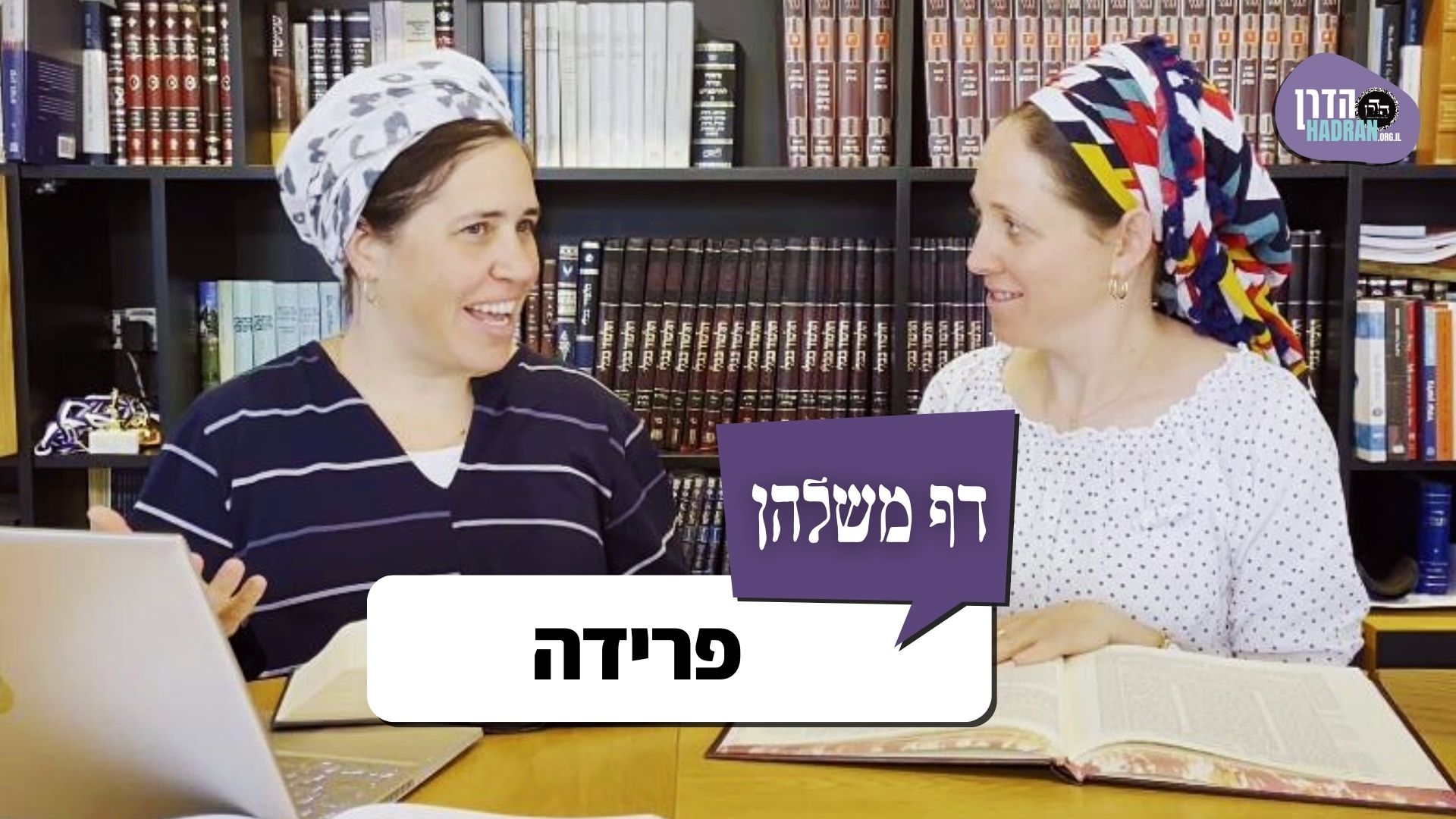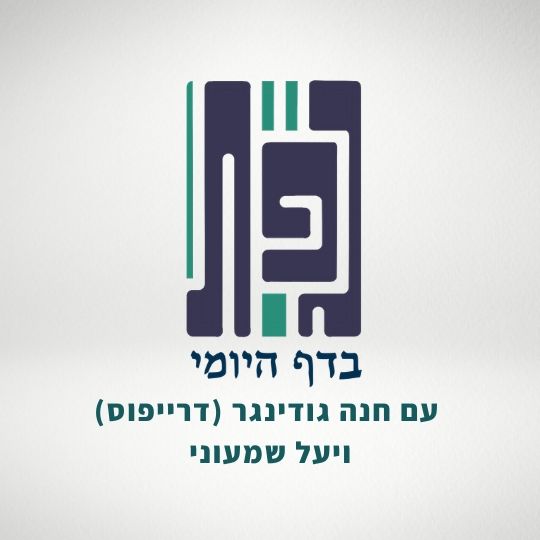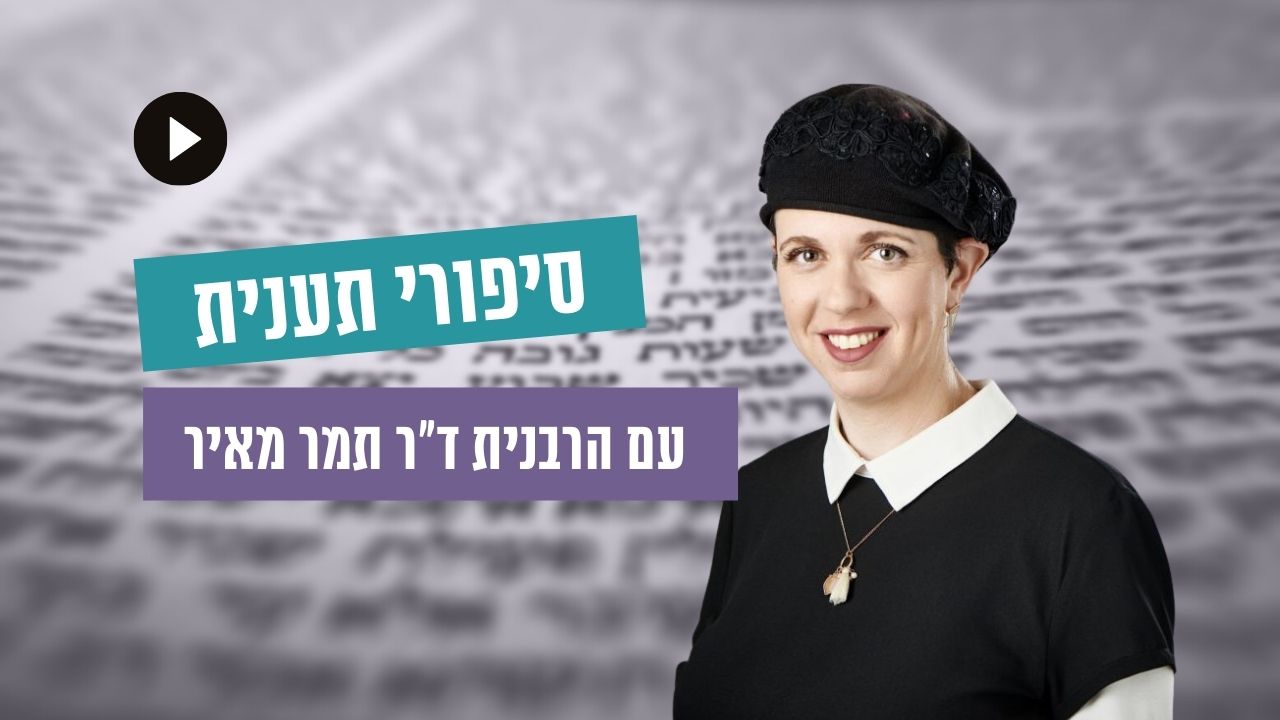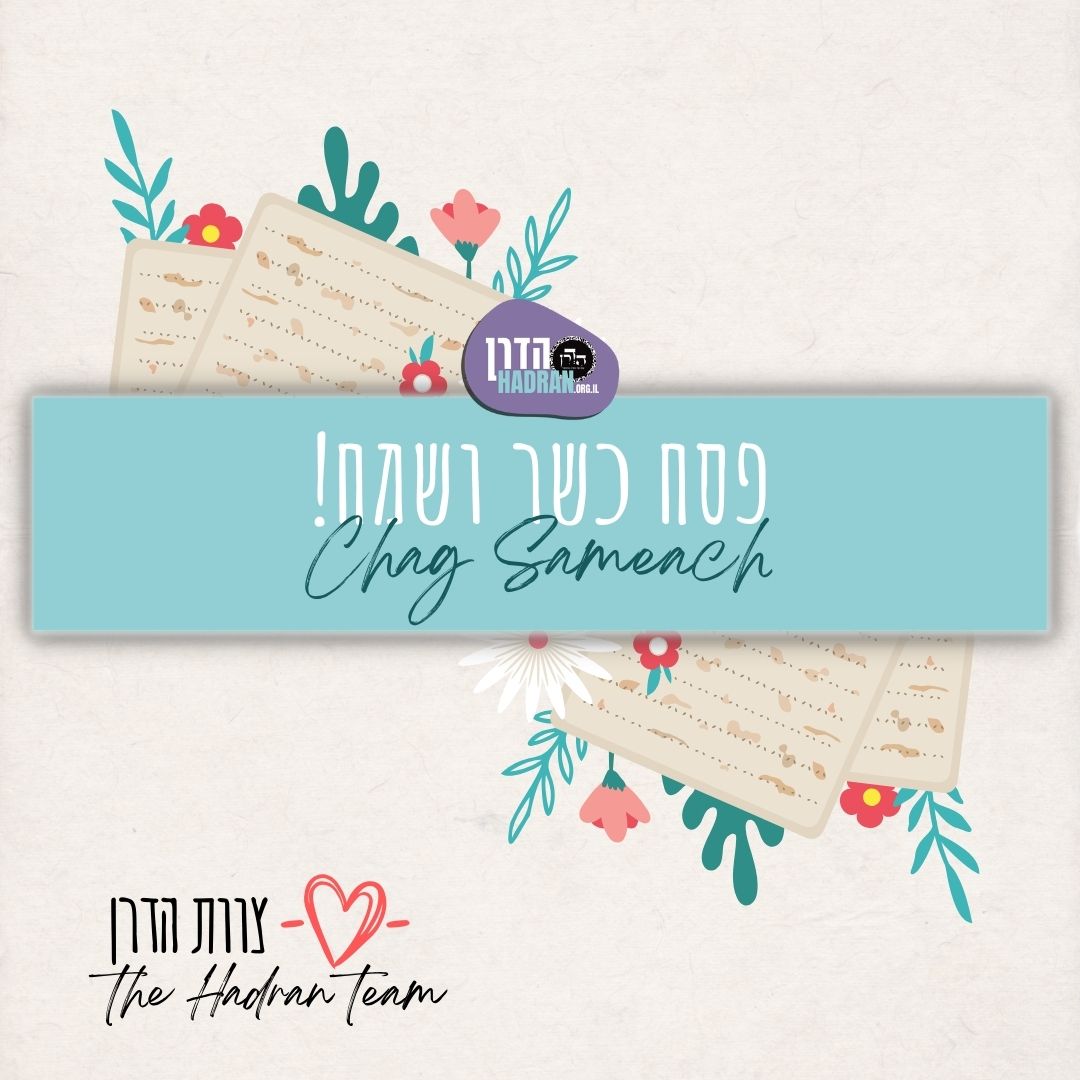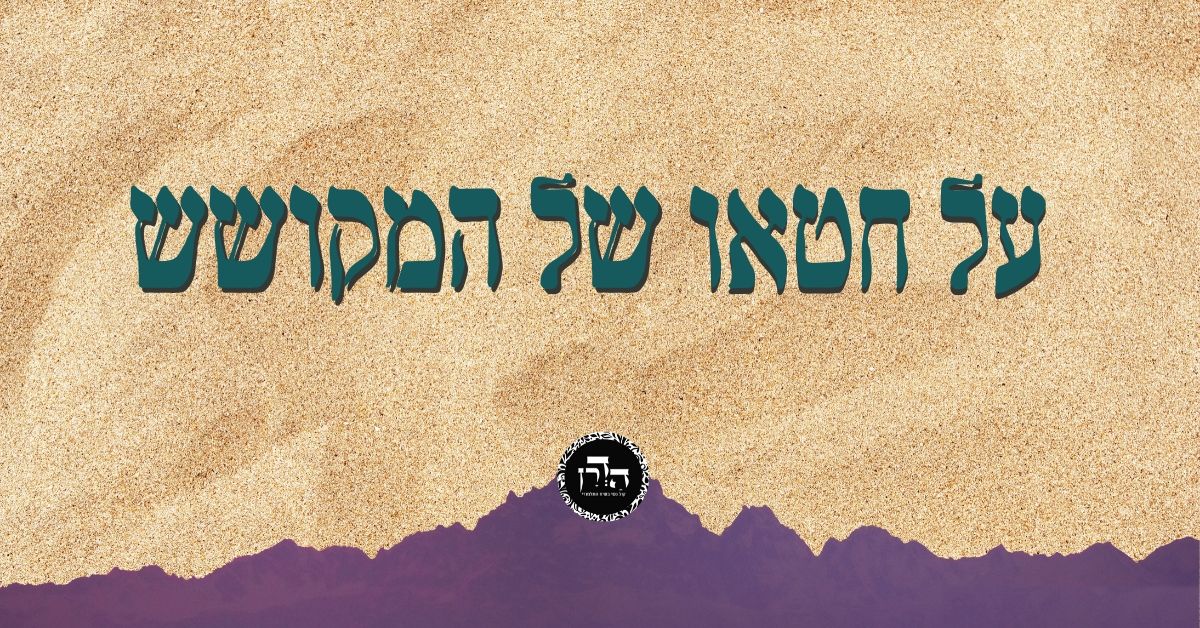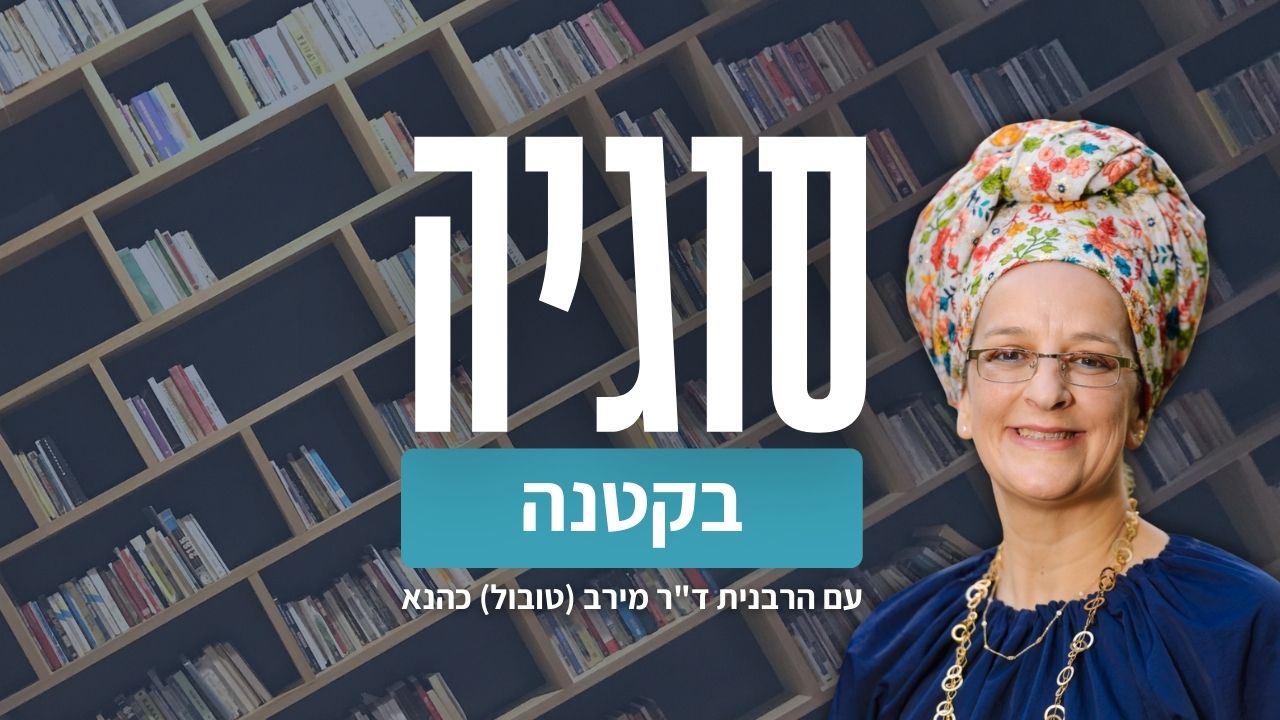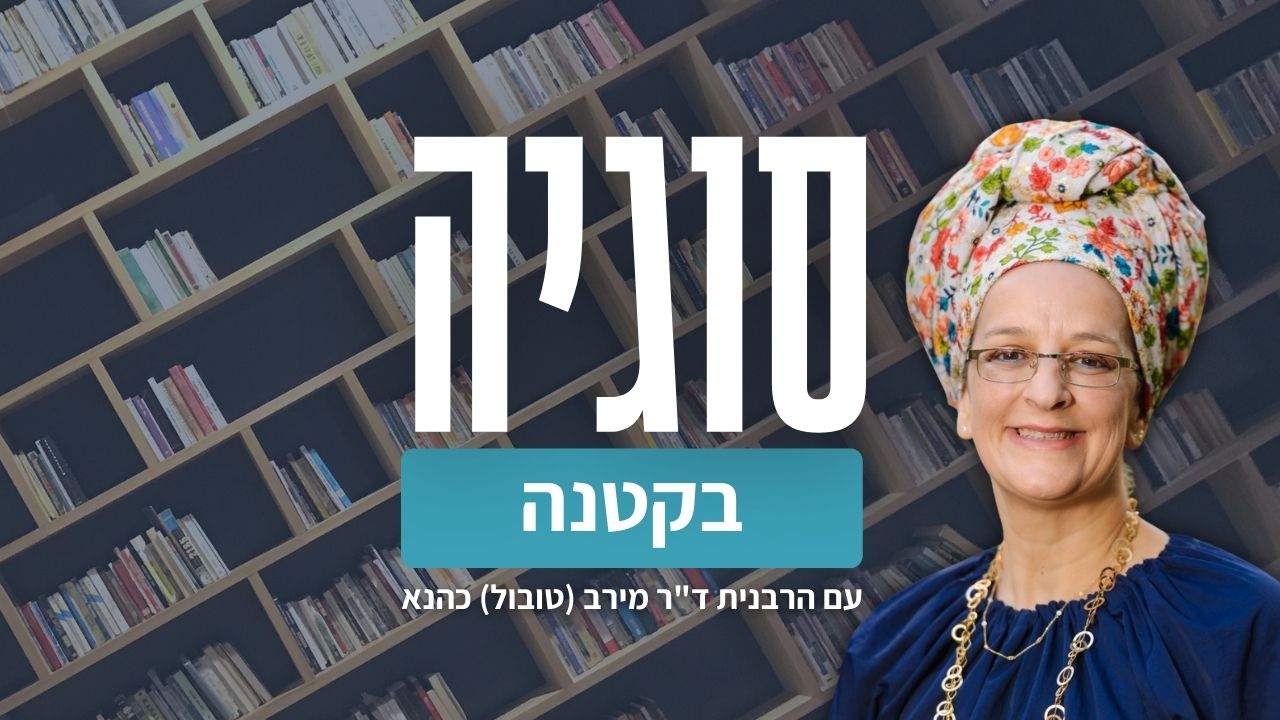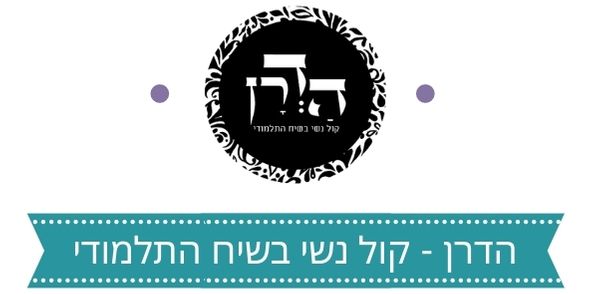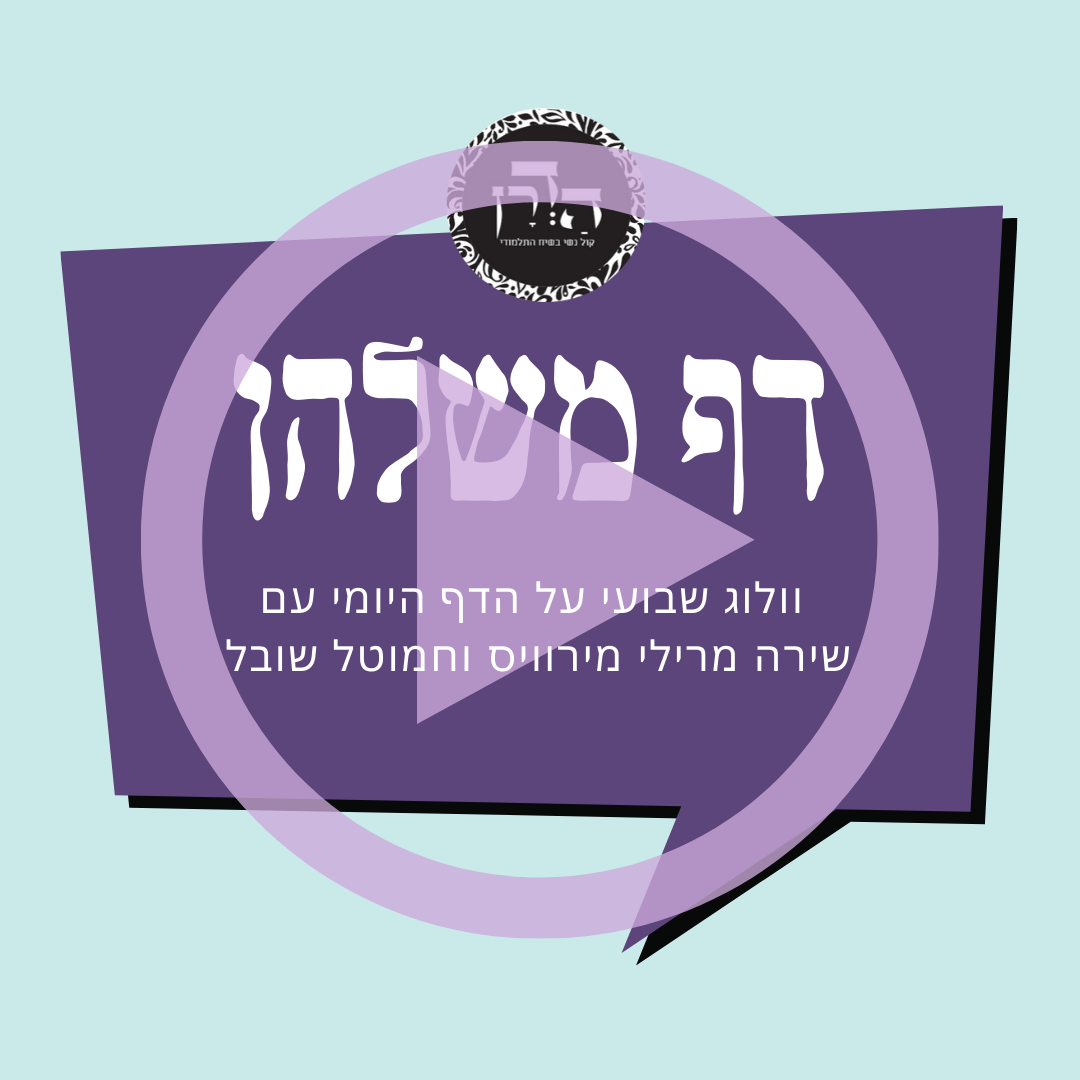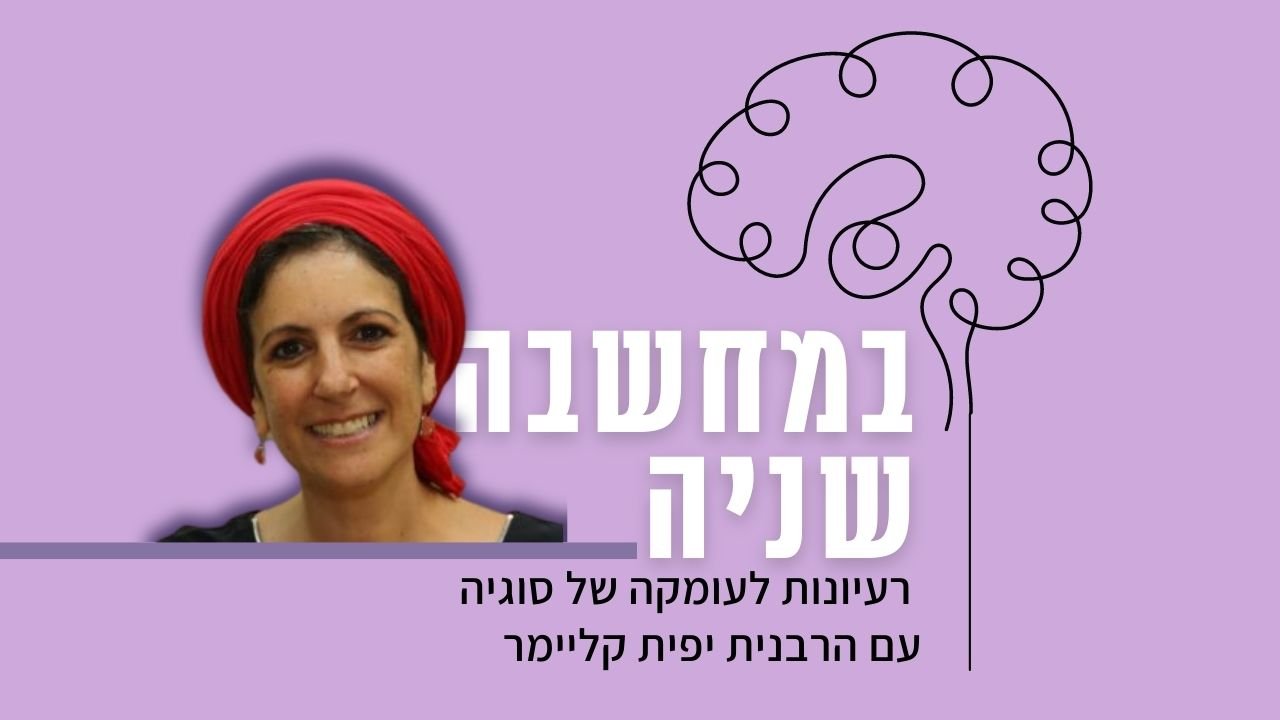הגמרא ממשיכה לדון בשיטת עולא שגבי דין מעילה בבהמות שמתו לאור מקורות אחרים. הגמרא מבחינה בין דברים שאנשים מרחיקים את עצמם מהם לבין דברים שאין אדם מרחיקים עצמן מהם. הגמרא מביאה קושי על רבה (אם עלו ירדו – בקדשי קדשים ששחטו בדרום) ומשאירה כקושי. הגמרא מביאה שאלה של ר’ אלעזר בקשר למי שהפריש עולה לבמת יחיד והביא בבמת ציבור ושחט בדרום – ושאל אם עלה על המזבח האם ירד. אפשר להבין מכך שלא שאל על מקרה רגיל (שהובא בבית המקדש) שהיה לו ברור מה ההלכה במקרה הזה. אבל לא ידעו אם היה לו ברור כרב יוסף או כרבה. כשזורקים הדם של קרבן שנתפגל, האם מוריד דין מעילה בקדשי קדשים או מכניס דין מעילה באימורי קדשים קלים? למה?
רוצה להקדיש שיעור?
כלים
העמקה
רוצה להבין מה באמת קורה מתחת לפני השטח של הסוגיה?
שיעורים, פודקאסטים והרחבות של מיטב המורות שלנו יפתחו לך עוד זוויות וכיווני חשיבה.
חדשה בלימוד הגמרא?
זה הדף הראשון שלך? איזו התרגשות עצומה! יש לנו בדיוק את התכנים והכלים שיעזרו לך לעשות את הצעדים הראשונים ללמידה בקצב וברמה שלך, כך תוכלי להרגיש בנוח גם בתוך הסוגיות המורכבות ומאתגרות.
פסיפס הלומדות שלנו
גלי את קהילת הלומדות שלנו, מגוון נשים, רקעים וסיפורים. כולן חלק מתנועה ומסע מרגש ועוצמתי.
מעילה ג
אָמֵינָא: חַטָּאת, הוֹאִיל וּלְכַפָּרָה קָא אָתְיָא – לָא בְּדִילִין מִינַּהּ, אֲבָל קָדָשִׁים, הוֹאִיל וְלָאו לְכַפָּרָה קָאָתֵי – בְּדִילִי מִנְּהוֹן, וְלֵית בְּהוּ מְעִילָה, קָא מַשְׁמַע לַן.
to say: Since a sin offering is brought for atonement, people do not distance themselves from it after it dies, as they realize that it is no longer fit to atone. Therefore, in order to ensure that people do not show disrespect, the Sages decreed that one is liable for its misuse. But with regard to other sacrificial animals of the most sacred order, since they are not brought for atonement, people still distance themselves from them after the animals die, and therefore one might think that there is no need to decree that they are subject to the halakhot of misuse. Consequently, Ulla teaches us that even other sacrificial animals that die are subject to misuse by rabbinic decree.
וְחַטָּאת שֶׁמֵּתָה מִי אִית בַּהּ מְעִילָה? וְהָתְנַן: חַטָּאוֹת הַמֵּתוֹת וּמָעוֹת הַהוֹלְכוֹת לְיָם הַמֶּלַח – לֹא נֶהֱנִין וְלֹא מוֹעֲלִין!
The Gemara asks: And is a sin offering that died subject to the halakhot of misuse? But didn’t we learn in a baraita: With regard to sin offerings that are left to die because they are no longer fit for the altar, from which one is prohibited to derive benefit, and likewise money from which one is prohibited to derive benefit, which goes to the Dead Sea to be destroyed, one may not derive benefit from them ab initio, but if one derived benefit from them, he is not liable for their misuse?
אָמְרִי: חַטָּאוֹת הַמֵּתוֹת – בְּחַיֵּיהֶן בְּדִילִין מִנְּהוֹן, לְאַפּוֹקֵי הֵיכָא דְּמֵחַיִּים – דְּלָא בְּדִילִין מִינֵּיהּ.
They say in response to this question: With regard to sin offerings that are left to die, since even during their lifetimes people distance themselves from them, as they are no longer fit for sacrifice, there was no need for the Sages to institute a prohibition of misuse. This is to the exclusion of a sin offering that was fit during its lifetime, as people do not distance themselves from it, and therefore the Sages saw fit to institute a prohibition of misuse after it dies.
אֵיתִיבֵיהּ רַב יוֹסֵף לְרַבָּה חֲדָא מִגּוֹ חֲדָא, וַחֲדָא מִגּוֹ חֲדָא:
§ The Gemara returns to the dispute with regard to offerings that were slaughtered in the wrong place and then were brought up to the altar. Rabba maintains that such offerings are removed from the altar while Rav Yosef rules that once they ascended the altar they do not descend from it and are burned. Rav Yosef raised an objection to Rabba, one source from another one, and that one from another one, i.e., his objection is based upon the combination of several sources.
וְכוּלָּן, אֵין מְטַמְּאִים בְּגָדִים אַבֵּית הַבְּלִיעָה וּמוֹעֲלִין בָּהֶן,
The Gemara elaborates: The mishna on Zevaḥim 66b, which deals with bird offerings that were disqualified for having either the napes of their necks pinched or their blood sprinkled in the wrong place, teaches: And all of the offerings mentioned in that mishna do not render one who swallows their meat ritually impure to the extent that his garments are rendered impure when it is in the throat. Although the offering is disqualified, since the nape of its neck was pinched as part of the rite one is not rendered impure by swallowing an olive-bulk of its meat, as is the halakha with regard to a carcass of a kosher bird. And one who derives benefit from these offerings is liable for misusing them.
חוּץ מֵחַטַּאת הָעוֹף שֶׁעָשָׂה לְמַטָּה, כְּמַעֲשֵׂה חַטַּאת הָעוֹף לְשֵׁם חַטָּאת.
This is the halakha concerning all bird offerings, except for the bird sin offering that one performed below the red line, according to the procedure of a bird sin offering, and for the sake of a sin offering. Since it was sacrificed correctly, its meat is permitted to the priests and is no longer subject to the halakhot of misuse.
וְקָתָנֵי עִילָּוֵיהּ: כׇּל שֶׁהָיָה פְּסוּלוֹ בַּקֹּדֶשׁ – אֵינוֹ מְטַמֵּא בְּגָדִים אַבֵּית הַבְּלִיעָה, וְכׇל שֶׁלֹּא הָיָה פְּסוּלוֹ בַּקֹּדֶשׁ – מְטַמֵּא בְּגָדִים אַבֵּית הַבְּלִיעָה.
And it is taught in another mishna (Zevaḥim 68b) with regard to the same disqualified bird offerings: For any one of them whose disqualification occurred in the sacred area, i.e., the Temple courtyard, e.g., if the nape of its neck was pinched at night, it does not render the garments of one who swallows it impure when the meat is in the throat. And for any one of them whose disqualification did not take place in the sacred area, it does render the garments of one who swallows it impure when the meat is in the throat.
וְקָתָנֵי: כׇּל שֶׁהָיָה פְּסוּלוֹ בַּקֹּדֶשׁ – אִם עָלוּ, לֹא יֵרְדוּ. תְּיוּבְתָּא דְּרַבָּה! תְּיוּבְתָּא.
And it is taught in yet another mishna (Zevaḥim 84a): With regard to any offering whose disqualification took place in the sacred area, the sacred area renders the offering acceptable, and if such offerings ascended onto the altar they shall not descend. The first mishna establishes that birds disqualified because their rites were performed in the wrong place are subject to the halakhot of misuse. The second mishna teaches that these same birds are considered items whose disqualification occurred in the sacred area. The last mishna establishes that if items whose disqualification occurred in the sacred area ascend the altar, they do not descend. By citing all these mishnayot, Rav Yosef demonstrates that an offering that is slaughtered in the wrong place is not removed from the altar, contrary to Rabba’s opinion. The Gemara concludes: The refutation of the opinion of Rabba is indeed a conclusive refutation.
וְהָא דִּפְלִיגִי בַּהּ רַבָּה וְרַב יוֹסֵף פְּשִׁיטָא לֵיהּ לְרַבִּי אֶלְעָזָר, דְּאָמַר רַבִּי אֶלְעָזָר: עוֹלַת בָּמַת יָחִיד, שֶׁהִכְנִיסָהּ לִפְנִים –
§ The Gemara notes: And that matter with regard to which Rabba and Rav Yosef disagree is obvious to Rabbi Elazar, as Rabbi Elazar says: In the case of a burnt offering consecrated to be sacrificed on a personal altar, during the period when it is permitted to do so, that one brought inside the Temple courtyard,
קְלָטוּהָ מְחִיצוֹת לְכׇל דָּבָר.
it is admitted by the partitions of the courtyard for all matters; and from that point onward it has the status of a burnt offering sacrificed in the Temple with regard to all halakhot.
בָּעֵי רַבִּי אֶלְעָזָר: [עוֹלַת בָּמַת יָחִיד שֶׁהִכְנִיסָהּ, שֶׁנִּפְסְלָה] – עָלוּ, מַהוּ שֶׁיֵּרְדוּ?
The Gemara continues: In this regard, Rabbi Elazar asks: In the case of a burnt offering consecrated to be sacrificed on a personal altar that one brought into the Temple courtyard and it was rendered unfit for sacrifice, e.g., it was slaughtered in the south rather than its proper place in the north, if its limbs ascended the altar to be sacrificed, what is the halakha as to whether they should descend? Although the animal was disqualified due to the change in location, had it been slaughtered in the south on a personal altar it would not have been disqualified.
מִדְּקָמִיבַּעְיָא לֵיהּ לַחֲדָא, מִכְּלַל דְּאִידַּךְ פְּשִׁיטָא לֵיהּ, אִי כְּרַבָּה אִי כִּדְרַב יוֹסֵף.
The Gemara concludes: From the fact that Rabbi Elazar asked this question only with regard to this one case, one can conclude that in the other case, where the burnt offering was consecrated for sacrifice in the Temple, the halakha of the limbs that ascended the altar is obvious to him. He either holds that the halakha is that they are not sacrificed, in accordance with the opinion of Rabba, or he maintains that they are sacrificed, in accordance with the opinion of Rav Yosef.
חֲדָא מִגּוֹ חֲדָא קָמִיבַּעְיָא לֵיהּ:
The Gemara rejects this inference, as it is possible that Rabbi Elazar was actually uncertain with regard to that case as well; but he raises one dilemma as a result of the other. In other words, Rabbi Elazar was asking two questions, one predicated on the other, and the second question is valid regardless of whether he holds in accordance with the opinion of Rabba or Rav Yosef.
עַד כָּאן לָא קָאָמַר רַבָּה הָתָם אִם עָלוּ – יֵרְדוּ, מְחִיצָה כְּתִיקְנָהּ –
The Gemara elaborates: Even if Rabbi Elazar holds in accordance with the opinion of Rabba, that in a regular case the limbs are removed from the altar, one can claim that Rabba says that if the limbs ascend the altar they shall descend only there, i.e., if the burnt offering was consecrated for sacrifice in the Temple. In that case, the owner consecrated the offering with the intention of sacrificing it within the partition of the courtyard, where slaughtering is performed properly, in the north.
פָּסְלָה, שֶׁלֹּא כְּתִיקְנָהּ – לֹא פָּסְלָה,
Consequently, if it was slaughtered in the south, that renders the offering entirely disqualified, and therefore even if it ascended the altar it must descend. But in a case where he consecrated the offering in order to sacrifice it improperly on a personal altar, slaughtering it in the south does not render the offering entirely disqualified, and therefore if it ascends the altar it does not descend.
אוֹ דִילְמָא: אֲפִילּוּ לְרַב יוֹסֵף דְּאָמַר אִם עָלְתָה – לֹא תֵּרֵד, מְחִיצָה כְּתִיקְנָהּ – קָלְטָה, שֶׁלֹּא כְּתִיקְנָהּ – לָא קָלְטָה. תֵּיקוּ.
Or perhaps, the opposite is the case: Even according to the opinion of Rav Yosef, who said that if it ascends the altar it shall not descend, that halakha applies only in a case where the owner consecrated the offering in order to sacrifice it within the partition of the courtyard, in which case it was consecrated properly. In such an instance, the offering is admitted by the partitions of the courtyard, and therefore even in a case where it was disqualified, if it ascended the altar it does not descend. By contrast, in a case where he consecrated it in order to sacrifice it improperly on a personal altar, the offering is not admitted at all by the partitions of the courtyard, which means that even if it ascends the altar it must descend. The Gemara concludes that the dilemma shall stand unresolved [teiku].
אָמַר רַב גִּידֵּל אָמַר רַב: זְרִיקַת פִּיגּוּל אֵינוֹ מוֹצִיא מִידֵי מְעִילָה בְּקׇדְשֵׁי קָדָשִׁים, וְאֵינוֹ מֵבִיא לִידֵי מְעִילָה בְּקָדָשִׁים קַלִּים.
§ With regard to the misuse of offerings that were rendered unfit, Rav Giddel says that Rav said: Sprinkling the blood of an offering with the intent to consume it after its appointed time [piggul], in a case where there was piggul intent during the slaughter as well, does not remove the meat of the offering from the status of being subject to the halakhot of misuse, in the case of offerings of the most sacred order. The reason is that its meat is still classified as “the sacred items of the Lord” (Leviticus 5:15), since there was no proper sprinkling that permitted the priests to partake of the offering, as it is piggul. Similarly, this sprinkling does not bring the sacrificial portions of offerings of lesser sanctity into the status of being subject to the halakhot of misuse, as only a valid sprinkling confers that status.
יְתֵיב אַבָּיֵי וְקָאָמַר לַהּ לְהָא שְׁמַעְתָּא, אֵיתִיבֵיהּ רַב פָּפָּא לְאַבָּיֵי: הַשּׁוֹחֵט אֶת הַתּוֹדָה לִפְנִים, וְלַחְמָהּ חוּץ לַחוֹמָה – לֹא קִדֵּשׁ אֶת הַלֶּחֶם.
The Gemara relates that Abaye sat and related this halakha, which Rav Giddel said that Rav said. Rav Pappa raised an objection to Abaye from a mishna (Menaḥot 78b): With regard to one who slaughters the thanks offering in its proper place inside the Temple courtyard, and at that time, its forty accompanying loaves were outside the wall, where it is prohibited to partake of the loaves, the loaves are not sanctified by this slaughtering.
שְׁחָטָהּ עַד שֶׁלֹּא קָרְמוּ פָּנֶיהָ בַּתַּנּוּר, וַאֲפִילּוּ קָרְמוּ כּוּלָּן חוּץ מֵאַחַת מֵהֶן – לֹא קָדַשׁ הַלֶּחֶם. שְׁחָטָהּ חוּץ לִזְמַנָּהּ וְחוּץ לִמְקוֹמָהּ – קָדַשׁ הַלֶּחֶם.
Likewise, if he slaughtered the thanks offering before the surface of the loaves formed a crust in the oven, and this is the halakha even if the surface of all the loaves formed a crust except for one of them, the loaves are not sanctified, even those that had already formed a crust. If the priest slaughtered the thanks offering with the intent to partake of it or to burn the portions consumed on the altar beyond its designated time and it was thereby rendered piggul, or outside its designated area and was disqualified, the loaves are sanctified and are subject to the halakhot of misuse. This is presumably the case even if he also sprinkled the blood with piggul intent, as the mishna does not differentiate in this regard.
אַלְמָא פִּיגּוּל מַיְיתֵי לַהּ לִידֵי מְעִילָה! אִישְׁתִּיק.
The Gemara explains the objection: Evidently, sprinkling the blood of offerings of lesser sanctity with the intent of piggul subjects offerings of lesser sanctity to the halakhot of misuse. This apparently contradicts the opinion that Abaye stated that Rav Giddel said that Rav said. Abaye was silent, and was unable to resolve the difficulty against Rav’s statement.
כִּי אֲתָא לְקַמֵּיהּ דְּרַבִּי אַבָּא, אֲמַר לֵיהּ: בִּזְרִיקָה.
When Abaye came before Rabbi Abba and reported Rav Pappa’s comments, Rabbi Abba said to Abaye: That is not a difficulty, as Rav Giddel said that the intent of piggul during sprinkling does not subject offerings of lesser sanctity to the halakhot of misuse. Since the offering is rendered full-fledged piggul and is disqualified, it cannot become subject to the halakhot of misuse. By contrast, the mishna in Menaḥot is referring specifically to the intent of piggul during slaughtering, whereas there was no such intent during sprinkling. In such a case, the sprinkling was performed with proper intent, and therefore it subjects the offering to the halakhot of misuse.
אֲמַר לֵיהּ רַב אָשֵׁי לְרָבָא: וְהָא אָמַר עוּלָּא: קוֹמֶץ פִּיגּוּל שֶׁהֶעֱלוֹ לְגַבֵּי מִזְבֵּחַ – פָּקַע פִּיגּוּלוֹ מִמֶּנּוּ,
Rav Ashi said to Rava, with regard to this explanation of Rav Giddel’s statement: But doesn’t Ulla say: In the case of a handful that is piggul, which is unfit for sacrifice, that was brought up onto the altar to be sacrificed and was burned by the fire of the altar, its piggul status lapsed from it, and it is fit for sacrifice?
וּקְמִיצָה הַיְינוּ שְׁחִיטָה!
And since the removal of the handful in the case of the meal offering is the same as slaughtering animal offerings, i.e., it is the equivalent rite, and in this case the improper intent during the removal of the handful rendered the meal offering piggul, the same should apply to slaughtering in the case of an animal offering: The sacrificial portions of the offerings of lesser sanctity should be rendered full-fledged piggul by slaughtering alone with the intent of piggul, regardless of the intent during sprinkling. If so, Rabbi Abba’s answer above is incorrect.
אֲמַר לֵיהּ: אִיסּוּרָא דְּמַיְיתֵי לִידֵי פִיגּוּל.
Rava said to Rav Ashi: This is not a difficulty, as Ulla did not mean that the intent during the removal of the handful alone rendered the meal offering full-fledged piggul. Rather, he meant that a prohibited act was performed upon it which brings it to a status of piggul, but the full status of piggul is attained only if there is also improper intent at the time of the sacrificing of the handful, which is equivalent to sprinkling in the case of an animal.


